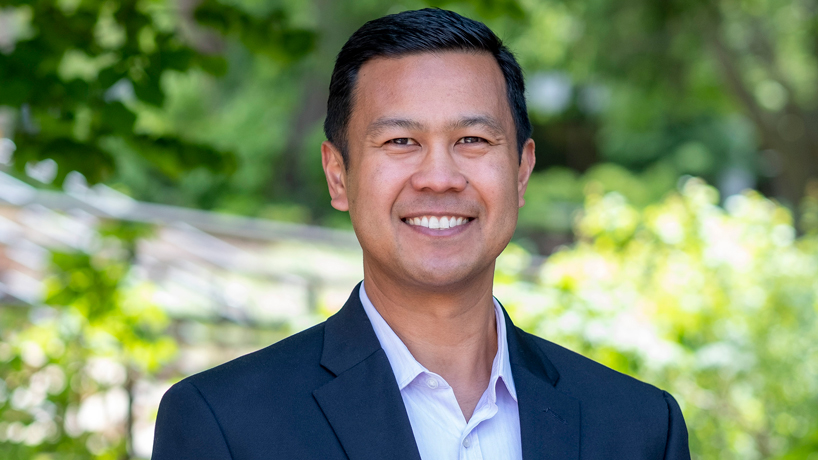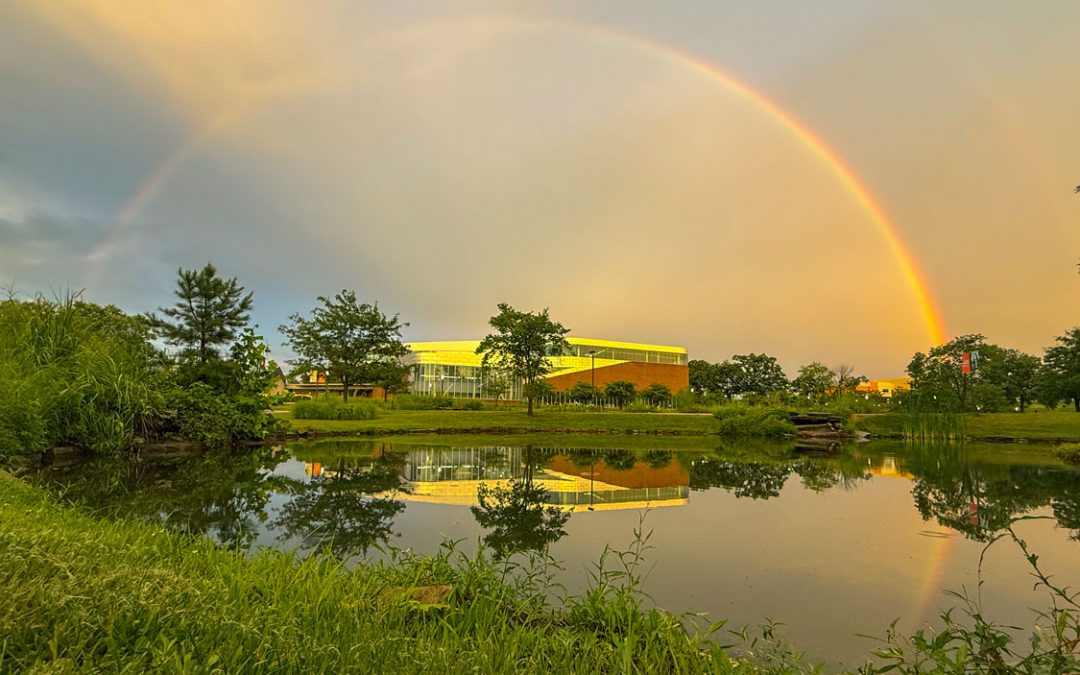
UMSL political scientist Adriano Udani is the principal investigator on a $250,000 grant project, in partnership with the Inter-Faith Committee on Latin America and sponsored by the Henry Luce Foundation. It supports asylum seekers and assists them as they push for policy change. (Photo by August Jennewein)
The Henry Luce Foundation has awarded a three-year, $250,000 grant to University of Missouri–St. Louis Associate Professor Adriano Udani and colleagues at the Inter-Faith Committee on Latin America to support asylum-seekers as leaders and intellects to influence policy changes, including ending the use of harmful immigration surveillance tactics.
Udani, who is a member of UMSL’s Department of Political Science and the director of the Public Policy Administration Program, will serve as the principal investigator on the project, entitled “The Pursuit of Dignity: Honoring Intellect Among Asylum Seekers.” It is supported by the Henry Luce Foundation’s Religion and Theology Program as part of a new initiative to advance public knowledge on the topic of race, justice, and religion in America.
“The Pursuit of Dignity” aligns strongly with the foundation’s vision to build knowledge and use it to enhance action or implementation.
“Asylum-seekers will be positioned to lead the production of three main forms of practical knowledge,” Udani said. “First, they will highlight the physical and mental damage of ankle monitors and other immigration surveillance tactics that are inappropriately referred to as ‘alternatives to detention.’ Second, they will develop collective strategies to prevent further harm on oneself and others. Finally, they will visualize core values and priorities in creating reciprocal partnerships between academics and people beyond the academy to reimagine a world without prisons.”
The project will culminate with a national conference featuring sessions on faith, race, abolition, partnerships and mutual assistance informed and co-led by asylum-seekers in 2024.
Udani is working with a St. Louis-based team that includes IFCLA Executive Director Sara John; María Torres Wedding, the director of client services at the Migrant and Immigrant Community Action – or MICA – Project; and IFCLA Accompaniment Co-Coordinators Allie Seleyman and Ángel Flores Fontánez.
During the past year, the team has supported a local group of more than 50 individuals who are seeking asylum and have been forced to wear GPS ankle monitoring devices while awaiting a decision in their cases – some for more than 24 months. Members of the group have named themselves “Migrantes Unidos Jamás Serán Vencidos” and have met monthly to build collective knowledge and use that power to advocate for the removal of their ankle monitors. With support from the Henry Luce Foundation, the partners will identify and support six similar “advocacy hubs” to bring this model to other cities in the United States over the next three years.
A hub will consist of a group of asylum-seekers, an academic researcher and an organization(s) that prioritizes alternatives to detention work and provides legal and/or social services and/or mutual assistance. Advocacy hubs will participate in a training on how to equitably offer information, resources and compensation for asylum-seekers to lead and own system changes as movement leaders in their respective region. A request for proposals will be sent in February 2022, and the application process will be competitive. Support teams of advocacy hubs are expected to start training in August 2022.
“All too often, it becomes the default to treat asylum-seekers as recipients of services and knowledge,” John said. “Our work in the last year has shown that when organizations and academics step back and flip the conversation from telling and delivering to one of asking and listening, the changes are significant. In our group, we’ve seen people build powerful, prophetic relationships grounded in their shared experience.
“We’ve also seen the same people bring skills, knowledge and experience from their identities beyond this glimpse of their lives as immigrants into their current realities, to critique, analyze and develop strategies that have successfully led to the removal of ankle monitors and the reduction of the harm caused by this criminalizing surveillance tactic.”
The majority of asylum-seekers who are granted permission to enter the United States are forced to live in detention. Most are released and placed in a formal process to remove them from the country. In these cases, they must file an asylum claim as a defense to their deportation within the first year. In some instances, asylum-seekers are detained at the border until they can pass a “credible fear interview” in front of an asylum officer. If a positive decision is made, asylum-seekers are released into the U.S. to await a full hearing before an immigration judge, which usually takes place several years later.
Torres Wedding, who has worked with asylum-seekers with ankle monitors for several years, has observed a violent journey and traumatic process of finding safety.
“A growing number of asylum-seekers in the U.S. are experiencing invasive immigration surveillance tactics that range from redundant and paternalistic to dangerous,” she said. “While their case is pending, asylum-seekers must endure weekly home visits, monthly check-ins, and GPS technology in the form of ankle monitors and cell phone apps. These unnecessary forms of surveillance often limit an individual’s employment and housing options and consistently result in harm to physical and mental health.”
“The Pursuit of Dignity” is based on a pilot study funded through the University of Missouri Strategic Investment Program and an organizing support grant from the Detention Watch Network. The pilot study used an “acompañamiento” (accompaniment) model that is rooted in a theological tradition of liberation and aims to restore hope, bear witness and walk with people while they fight for justice.
Working with Udani and the MICA Project, IFCLA fostered reciprocal community partnerships that build collaborative spaces that center asylum-seekers as policy leaders in discussions to end detention. The study developed procedures to de-center service providers, researchers and advocates; provided equitably pay to asylum-seekers for their time and knowledge; and helped visualize common dimensions of action priorities.
After the grant period, asylum-seekers will be positioned to educate others about the benefits of accompaniment and its relationship to restoring dignity and replenishing hope. Advocacy hubs will also build collective power throughout their region and increase inter-faith congregational activism on immigration issues. “The Pursuit of Dignity” aims to reverse commonly held assumptions that prescribe asylum-seekers as only recipients of others’ services and knowledge. Instead, the project recognizes the organic intellect and leadership of this population.
The Henry Luce Foundation seeks to enrich public discourse by promoting innovative scholarship, cultivating new leaders, and fostering international understanding. Established in 1936 by Henry R. Luce, the co-founder and editor-in-chief of Time, Inc., the Luce Foundation advances its mission through grant-making and leadership programs in the fields of Asia, higher education, religion and theology, art, and public policy.














